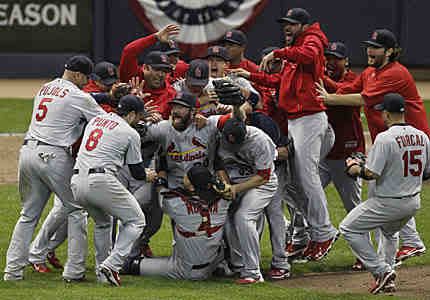 |
| http://i1113.photobucket.com/albums/k515/PixieDust1981/cardinals-2011-world-series.jpg |
Today, the MLB players and owners agreed to a new collective bargaining agreement. This year we already saw an NFL lockout that forced an alteration in the season schedule in case there was a delay to the beginning of the season. Now the NBA currently is still locked out, thus cancelling games until at least December 15th. Today though, we had a breath of fresh air when MLB players and owners agreed to a new deal without a long, drawn out, greed driven battle. This happened smoothly with MLB partially because of what is going and what went on with the three other major sports (NHL canceled the 2004-2005 season due to a labor dispute.) In addition to these examples, MLB had their 1994 strike shortened season to draw from. The 1994 season was producing story lines that are now forgotten about. The strike saw immediate ramifications, as there was a 20% decrease in average attendance from the 1994 season to the (shortened 144 games) 1995 season. It is even more dramatic to consider that in 1993, over 70 million fans went to ballparks. This is almost 20 million more than 1995, the year after the strike. The fans that did show up were not quiet. They made their frustration heard. Fans made dramatic attempts to get their points across, such as throwing $150 worth of $1 bills at players at Shea Stadium, and renting a plain to fly over Riverfront Stadium in Cincinnati with a sign declaring "Owners & Players: To hell with all of you!" Fans went to extremes to get their points across after the strike. Including never coming back.
The Montreal Expos, who were in the midst of their best season ever when the strike began, held an MLB best record of 74-40. They saw their attendance drop significantly in the years following the strike, which ultimately led to the move of their team to Washington D.C in 2005. Before the move in 2003, the Expos would play 22 home games in San Juan (this continued in 2004 as well.) The Expos never recovered from the strike and it ultimately left them having to move to D.C. Other story lines that fell victim to the strike were Tony Gwynn's pursuit of .400, as he was hitting .394 when the strike began and Giants' Matt Williams purist to break Roger Maris' home run record. He had 43 home runs with 47 games remaining. These chases and the success of the Expos made it tough for MLB to recover, but when it did, it came back stronger than ever. The last thing MLB wanted this year, was a situation that would mirror the 1994 and 1995 seasons. It would be highly unlikely to have another Mark McGuire and Sammy Sosa home run race to bring fans back once again.
The New Deal
The other major change is the postseason. This change is the highlight of the new CBA in my opinion. The league has set up a 10 team format, adding an extra wild card team in each league. If this format was in place this year, then it would have eliminated the drama that we saw in September when the Red Sox collapsed and the Rays beat them out on the last day of the season, as well as the Cardinals and Braves coming down to the final day of the regular season. If it is not broke, don't fix it. The league is coming off the most drama we've ever seen in the final days of the season, ending with two historic collapses. The one team wild card format has been successful since it began, why would they decide to change it now? Money of course...in my estimation, both sides agreed on the deal because it makes the owners more money with more teams being in the hunt and players reps agree on it because it gives more players a chance at making the post season. If the Braves and Cardinals had to play each other as the two NL wild card teams this year, who knows if the Cardinals would have been able to make it to the World Series and give us one of the greatest games in World Series history. This conversation was happening mid-season, so the thoughts on playoff expansion were well under way before the off-season talks. Like everything, it has its pros and cons however. The pros being that more teams have a chance, meaning teams will achieve higher attendance numbers, resulting in more money for the teams and more money to be spent on players to hopefully improve teams.
In a few years, we might begin to get used to the new playoff format and it won't be a big deal, but right now it is a change that might take some getting used to. This all comes on the heels of the announcement that the Astros will move to the AL West in 2013. It is going to be interesting to see the changes to the schedule that come with it, and when more details are released on MLB's plans that will be another story. But as for now, we have some changes, but the result is a season unharmed by talks of a lockout. And that is all we can ask for.
No comments:
Post a Comment